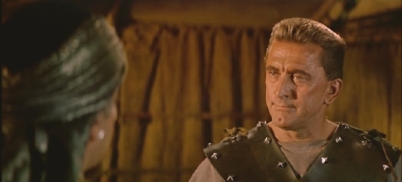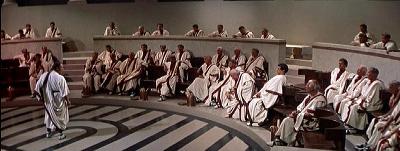A part of this viewing list: Criterion Collection Spine #105: Stanley Kubrick’s Spartacus.

The first time I saw this film I was about ten. Therefore I missed all the political criticism, sexual undertones [there should totally be a lounge band called The Sexual Undertones] and pathos contained in the film. I also knew jack about film history, so the importance of this epic in terms of backlot Hollywood machinations was also lost upon me. Now that I’ve seen it again, 15 years later, I have a slightly different perspective, although ultimately the same feeling about the film itself.
Spartacus is more about the people who made it and the reasons they made it and how they made it than it is about some long-dead revolutionary with a humongous chin. So many people had a vested interest in making Spartacus succeed [especially Kirk Douglas as producer-actor, Kubrick as director and Dalton Trumbo finally using his own name again as screenwriter] that the not-so-subtle socialist flavoring of the slave revolt mirrors the maverick wills of the filmmakers. This is a good example of why I don’t like auteur theory; too many people are involved in the production of a film and leave their mark on it, to speak of it solely as a director’s creation.
The reactionary tone to McCarthyite Communist witch-hunting could also find reflections with contemporary events; the focus on order at the cost of freedom, the compiling of lists of traitors, the opposing factions whose political maneuverings eventually destroy Spartacus. Yet where the noble goal of Spartacus ultimately fails, the efforts of Douglas & Co. succeeded in revitalizing a Hollywood that had been toeing the line to a select group of people for far too long. Even though the film moves far too slowly for my taste, I think we could use another Spartacus anytime.

• Criterion Essay by Stephen Farber
• Wikipedia article on the film